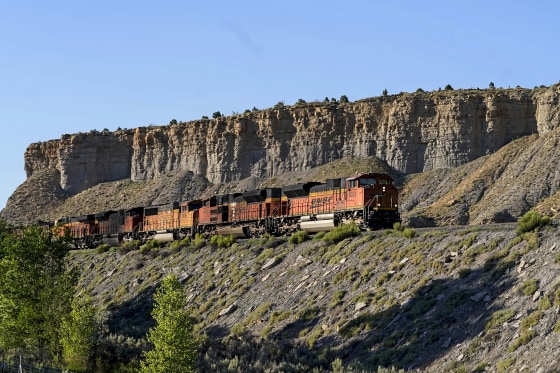
Washington A disagreement over whether federal officials carried out a thorough enough environmental analysis before sanctioning an 88-mile railroad project that would transport crude oil in Utah will be considered by the Supreme Court on Tuesday.
The Seven County Infrastructure Coalition, a coalition of local counties, has proposed a railroad that would connect northern Utah to the national rail network, facilitating the transportation of oil from the Uinta Basin.
Environmental organizations and Eagle County, Colorado, which says it will be negatively impacted by the railroad’s downstream consequences, are against construction.
After conducting an environmental evaluation, the Surface Transportation Board (STB), the federal body responsible for project approval, approved the project to move forward.
However, in a 2023 decision, the U.S. Court of Appeals for the District of Columbia Circuit ruled that the analysis and other aspects of the approval process were flawed and returned it to the government for additional consideration.
According to a federal legislation known as the National Environmental Policy Act (NEPA), the court found that the board neglected to take into account the environmental study’s wider consequences on vegetation and endangered species, the risk of wildfires, or the effects on water quality.
The coalition filed an appeal with the Supreme Court, arguing that NEPA does not mandate that a wide range of “imponderables” be taken into account that go well beyond the project’s actual location.
According to court documents from the coalition’s attorneys, the EPA would be required to take into account the possible effects of additional crude oil refining on areas as far away as Louisiana and Texas under the appeals court’s ruling.
NEPA assessment only compels the agencies to consider “reasonably foreseeable” environmental implications, according to legislation intended to streamline the process that was passed by Congress last year and signed into law by President Joe Biden.
At the Supreme Court, the Biden administration has supported the coalition’s claim that the STB’s review was enough.
In court documents, Solicitor General Elizabeth Prelogar stated that the board was exempt from having to take into account the railroad’s potential wider effects on oil and gas development.
“The board authorizes railroad construction and operation, not the development and use of the commodities that travel over those lines,” she stated.
In court documents, Eagle County attorneys stated that the appeals court was right to determine that the STB had not conducted a thorough review.
Nine out of ten trains using the new railroad will eventually pass through Eagle County along an existing route that runs along the Colorado River, the lawyers argued, meaning that Eagle County itself will be directly impacted.
Additionally, they contend that the recent legal change renders the court’s intervention unnecessary, which is one reason why the lawsuit should be dismissed.
The challengers also noted that even if the coalition prevails on the NEPA issue, the appeals court criticized other aspects of the STB’s decision, which means that additional scrutiny is still required before the project can proceed.
A public-private partnership including the counties and two businesses—the railroad operator Rio Grande Pacific Corp. and the infrastructure contractor DHIP Group—is building the railroad.
Citing the court’s ethics standards, Justice Neil Gorsuch stepped away last week and will not be involved in the case. Over a dozen members of Congress and liberal organizations had called on him to step down due to his prior ties to billionaire Philip Anschutz. Anschutz Exploration Corp., one of Anschutz’s businesses that engages in oil and gas drilling, submitted a brief supporting the coalition in the lawsuit.
Note: Every piece of content is rigorously reviewed by our team of experienced writers and editors to ensure its accuracy. Our writers use credible sources and adhere to strict fact-checking protocols to verify all claims and data before publication. If an error is identified, we promptly correct it and strive for transparency in all updates, feel free to reach out to us via email. We appreciate your trust and support!
